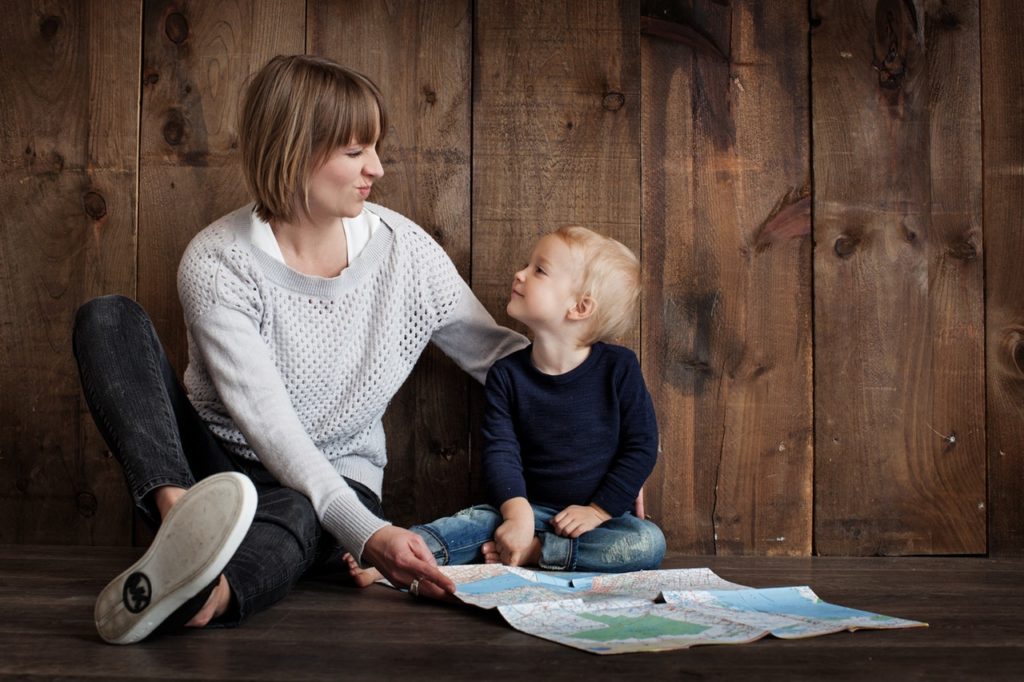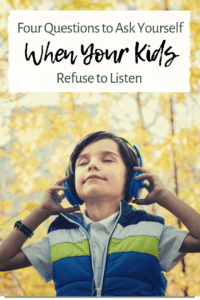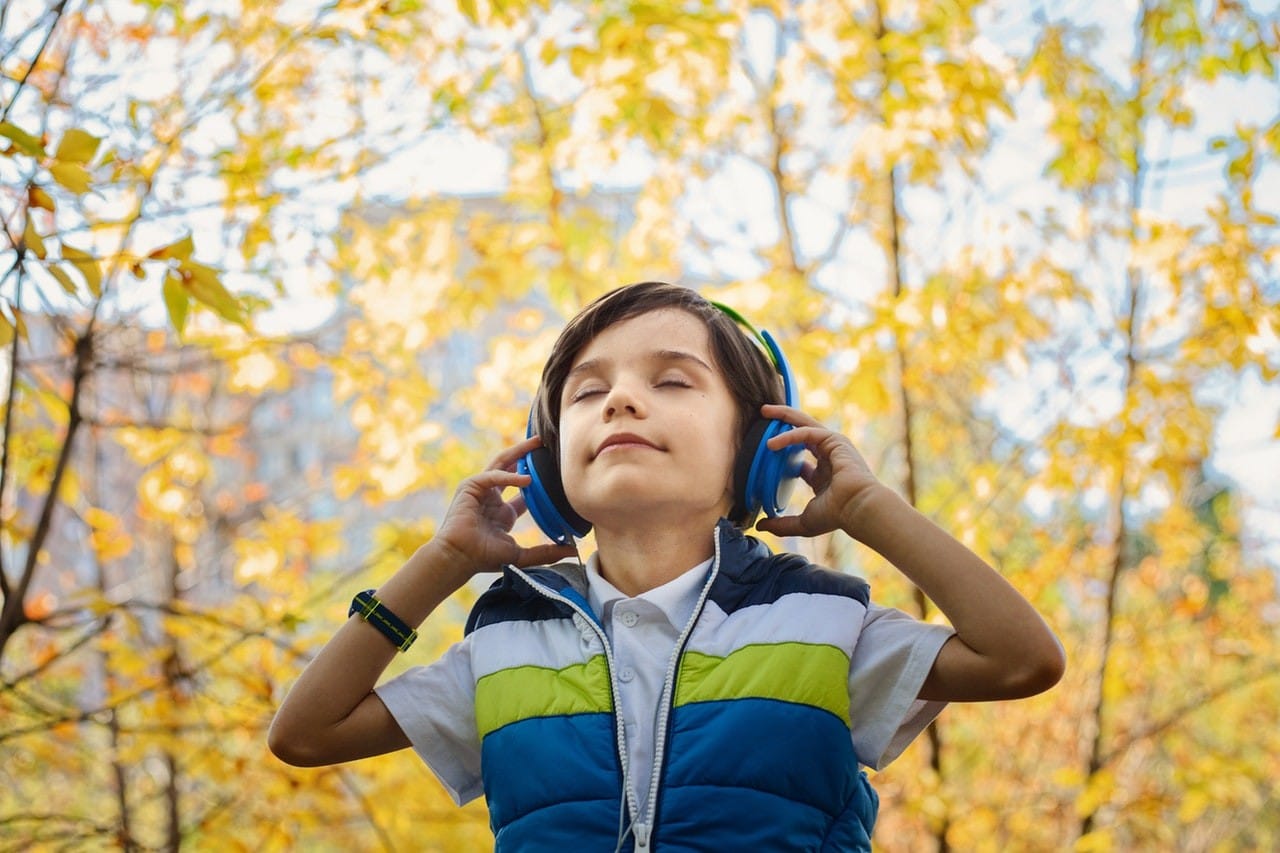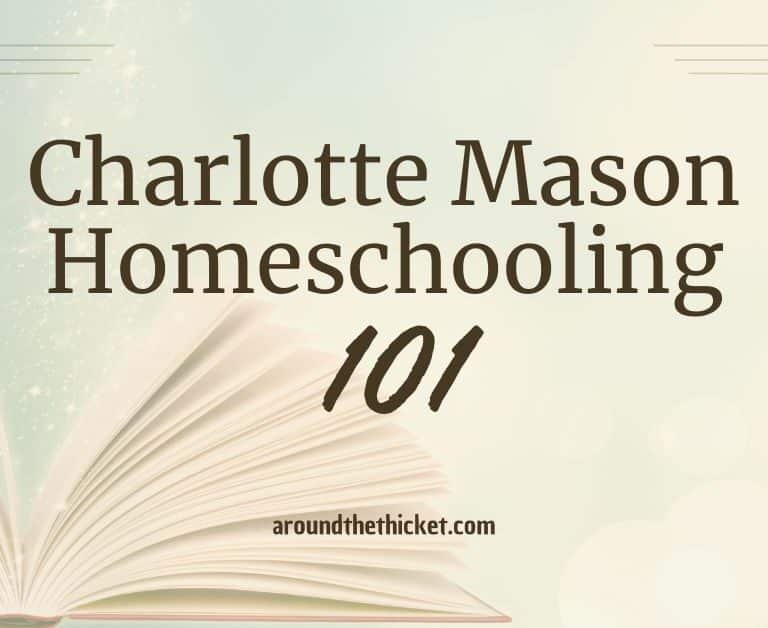Four Questions to Ask Yourself when Your Kids Don’t Listen
Raise your hand if you wish your kids would listen better. And by listen, you mean follow instructions and do what you ask. The first time.
If your hand is in the air, then mine is waving right next to yours. Sit in our house long enough and you will see plenty of examples of instructions falling on deaf ears, well-intentioned children getting distracted and forgetting their task, and plain old disobedience.
I’ve read great books on this topic that give advice on how to deal with this, based on neuroscience (and the personal experience of the authors). Books like No Drama Discipline (affiliate link) and How to Talk so Little Kids will Listen (affiliate link). But all the advice and reading in the world hasn’t saved my husband and me from frustration, irritation, and getting drawn into power struggles with our children.
As with most things, some days and weeks are better than others. But when we hit a stretch of conflicts with our kids, when they refuse to follow instructions or respect our authority, when our hackles are up more often than not, then it is time to step back and assess the situation. But rather than starting with what’s wrong with our kids, I suggest we reflect on ourselves first.
Charlotte Mason’s fourth chapter of Philosophy of Education (affiliate link) offers a discussion on authority and docility. In this chapter, she states that the teacher (I think we can substitute parent here), needs to “secure willing obedience”. And while sometimes that feels like a pipe dream, she doesn’t leave us without direction. Within her discussion, I found four questions we can ask ourselves when our kids aren’t listening to us. Our answers to these questions will help us navigate these tumultuous phases.
Are we giving our children the opportunity to do something noble when we ask them to obey?
We would all love our children to obey quickly and willingly. My house could be so tidy if little boys would simply put their wellies away when I ask. But instead of a quick fix, Charlotte Mason begins her practical discussion on securing obedience with this statement:
But parents and those who stand in loco parentis have a delicate task. There must be subjection, but it must be proud, work as a distinction, an order of merit.
Charlotte Mason, Towards a Philosophy of Education
All too often, I think we ask too little of our children, not too much. We ask our children to carry out seemingly mundane tasks, picking up socks, washing hands, fetching a new pack of baby wipes. Our attitude is usually akin to, ‘I need it to be done now, so do it now!’
While we want our kids to do what we say, what I think we ant more is kids who take pride in taking care of their homes, their bodies, and the people around them. Kids who feel a sense of nobility in being sent forth like a knight with a special task from his king.
What do your kids do quickly and willingly when you ask? For my kids, it’s delivering lunch to their dad working upstairs and helping chop vegetables for dinner. They glow with pride taking the plate into their dad and they love taking a real part in cooking a meal.
Not everything has to be grand. And we certainly don’t have to play up a request we make of our kids or pretend it’s something it’s not. But it is certainly worth reflecting on how well and how often we are inviting our kids to participate in something bigger than themselves.

Do I see myself as my child’s superior or his equal?
Most of us think of authority in terms of hierarchy. I am an authority over and above my kids. Therefore, my kids should do what I say. This illustration distracts us from what is really the case: our authority is delegated to us from God, and it belongs to our office, not ourselves. I discuss this in more detail in another post, but the most relevant idea we need to grasp is that, considering God’s authority over all humans, we are much, much closer to our children in terms of hierarchy than we sometimes care to realize.
Charlotte Mason states that, particularly when it comes to education, we are essentially the equals of our children:
There is no great gulf between teacher and taught; both are pursuing the same ends, engaged on the same theme, enriched by mutual interests.
Charlotte Mason, Towards a Philosophy of Education
When the end goal is Christlikeness, we realize that both we and our children are on the same journey, and that we, as parents, have by no means arrived at the destination. On one hand, this should give us a healthy dose of humility. On the other, a renewed sense of compassion for our children.

Am I behaving as one under authority?
If our kids aren’t listening to us, it’s worth reflecting on what sort of examples they have before them. Do they see others acting with obedience and docility? Do they see us embodying these characteristics? Consider this quote from Charlotte Mason:
The sense of must should be present with children; our mistake is to act in such a way that they, only, seem to be law-compelled while their elders do as they please…Two conditions are necessary to secure all proper docility and obedience […] (First) the teacher, or other head may not be arbitrary but must act so evidently as one under authority that the children, quick to discern, see that he too must do the things he ought; and therefore the regulations are not made for his convenience.
Charlotte Mason, Towards a Philosophy of Education
I’ll be honest: I don’t have a very strong sense of must. I don’t usually see my responsibilities and duties as a mark of distinction. God is my king, but I’m a rather lazy and reluctant knight. I so often go about taking care of my children, house, and church responsibilities without enthusiasm, doing the bare minimum to get by, at the last possible minute. So, should I be surprised when I see the same attitudes in my kids?
Charlotte Mason challenges us on this point. Our children are not the only people under authority, and when we fail to demonstrate that even we, as parents, are under God’s authority, the requests we make of our children seem random, erratic, and something to begrudge.
What’s more, when I fail to respect God’s authority over my life, my requests really are random and erratic. They often are self-centered and about making my life easier, rather than teaching how to serve our ultimate Authority.
Beyond this, when my kids get out of hand, it’s often because I’m shirking my responsibilities that come with my role as a parent. I want to ignore why my kids are whispering in the kitchen (spoiler: they are making a mess), because I don’t want to stop what I’m doing, enforce a limit and supervise clean up. However, when I’m obedient to my Authority, and fulfilling my role as a parent well, I am alert, nipping problems in the bud, and conflicts (and messes) don’t escalate to the point where I want to hide under my duvet for the rest of the day.

Does my child have freedom?
The other condition is that children should have a fine sense of the freedom which comes of knowledge which they are allowed to appropriate as they choose, freely given with little intervention from the teacher.
Charlotte Mason, Towards a Philosophy of Education
Charlotte Mason held that ‘All education is self-education’. There is nothing a teacher can do to force learning on another person. Instead, it is the individual who must think through and ‘digest’ ideas and make them their own. Children, she says, will choose which ideas to chew on. The teacher’s role is to lay a full and varied table of ideas to present to the student.
While Charlotte Mason is specifically writing about authority in an educational setting, I think we can certainly abstract her ideas to parenting. Children have responsibility for their own learning: do they have similar responsibility elsewhere?
Since my kids were very little, I worked hard to let them initiate their own play. When we had free time available, I personally felt that it was their responsibility to get started and choose a book or a toy. I would happily watch, be present, and participate when they invited me into their play, but entertaining my kids has never been my job.
More generally, we need to challenge ourselves on where our responsibilities end, and our children’s responsibilities begin. Yes, we make time for lessons, for chores, for meetings and clubs. But outside of that structure, our kids need to hold the responsibility for how they spend their time.
Do we let our kids color their sheep pink if they want to? Do we give them a digging patch in the garden where they can make messes and mud pies if they want to? Do we let them choose what books from the shelf they look at in their free time?
I get the impression that a lot of us, including myself, want our kids to spend more time outdoors. Can we balance mandatory outdoor time with liberty? I might decide that we are going on a walk to our local woodland (the mandate), but the kids can choose which paths we take, where we stop to play, when we move on, and what to play while we’re out (the liberty). Freedom abounds within my simple limit of the decision to take a walk.
If our children seem to constantly push back on our authority, if we’re often in conflict, and the atmosphere of our home is souring, then it may be time to step back and put our kids into a situation where they have responsibility and authority over how they are spending their time. Of course, we put limits in place to keep them, others, and our house safe, but they choose where they go and what to do within those limits.

Really, parenting can be a tough gig. We are called to give our children opportunities to be noble. We must be humble in our authority. We need to develop a sense of ‘must’ so that our children see that we are also under authority. And of course, we must set limits, but ensure our children have freedom within them. Taken all at once, it is overwhelming.
It is so easy pursue quick fixes: little tips and tricks that help us navigate obstinance and conflict. Solutions that will guarantee us considerate, cooperative children. Tips and tricks, though, will never get to the heart of the issue. They won’t speak to the hearts of our children.
That is precisely why self-reflection matters and why we stand to gain so much by growing in our understanding of authority. Wrestling with this topic challenges our view of those daily skirmishes with our children. It sets our focus on the eternal rather than the immediate. It reminds us that we aren’t pursuing the convenience of obedient kids or the sense of power from having my child do as I say. Instead, our desire is to help our children be in a right relationship with God.
My children are born for eternity, and confided expressly to me, that I may educate them for being children of God.
JH Pestalozzi, Letters on Infant Education








One Comment